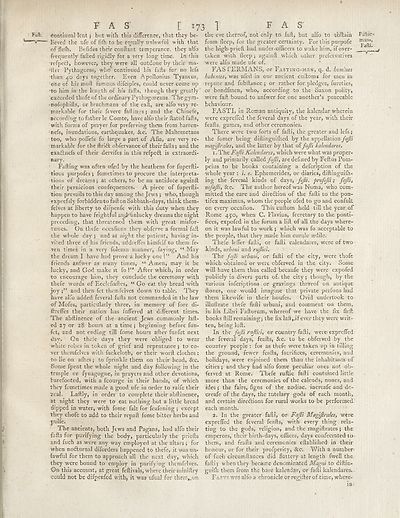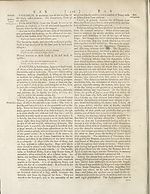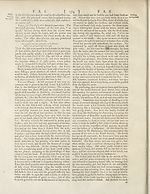Encyclopaedia Britannica > Volume 7, ETM-GOA
(191) Page 173
Download files
Complete book:
Individual page:
Thumbnail gallery: Grid view | List view

FAS [ 173 I S
continual lent; but with this difference, that they be¬
lieved the ufe of fifh to be equally unlawful with that
of flefh. Befidee their conflant temperance, they alfo
frequently faded rigidly for a very long time. In this
refpedt, however, they were all outdone by their ma¬
iler Pythagoras, who continued his falls for no lefs
•than. 40 days together. Even Apollonius Tyaneus,
one of his moil famous difciples, could never come up
•to him in the length of his fads, though they greatly
exceeded thofe of the ordinary Pythagoreans. The gym-
•nofophids, or brachmans of the ead, are alfo very re¬
markable for their fevere fadings; and the Chinefe,
according to father le Comte, have alfo their dated fads,
with forms of prayer for preferving them from barren*-
nefs, inundations, earthquakes, &c. The Mahometans
too, who podefs fo large a part of Ada, are very re¬
markable for the drift obfervance of their fads; and the
exaftnefs of their dervifes in this refpeft is extraordi¬
nary.
Fading was often ufed by the heathens for fuperdi-
tious purpofes; fometimes to procure the interpreta¬
tions of dreams; at others, to be an antidote againd
their pernicious confequences. A piece of fuperdi-
tion prevails to this day among the Jews; who, though
exprefsly forbidden to fadon Sabbath-days, think them-
felves at liberty to difpenfe with this duty when they
happen to have frightful aiiiFunlucky dreams the night
preceding, that threatened them with great misfor¬
tunes. On thefe occafions they obferve a formal fad
the whole day ; and at night the patient, having'in¬
vited three of his friends, addreffes himfelf to them fe-
ven times in a very folemn manner, faying, “ May
the dream I have had prove a lucky one !” And his
friends anfwer as many times, “ Amen, may it be
lucky, and God make it fo!” After which, in order
to encourage him, they conclude the ceremony with
thefe words of Ecclefiades, “ Go eat thy bread with
joy;” and then let them felves down to table. They
have alfo added feveral falls not commanded in the law
of Mofes, particularly three, in memory of fore di-
ftreffes their nation has fuffered at different times.
The abftinence of the ancient Jews commonly Jail¬
ed 27 or 28 hours at a time; beginning before fun-
fet, and not ending till fome hours after funfet next
day. On thele days they were obliged to wear
white robes in token of grief and repentance ; to co¬
ver themfelves with fackcloth, or their worft clothes:
to lie on afhes; to fprinkle them on their head, &c.
Some fpent the whole night and day following in the
temple or fynagogue, in prayers and other devotions,
barefooted, with a fcourge in their hands, of which
they fometimes made a good ufe in order to raife their
zeal. Laftly, in order to complete their abftinenee,
at night they were to eat nothing but a little bread
dipped in water, with fome fait for feafoning ; except
they chofe to add to their repall fome bitter herbs and
pulfe.
The ancients, both Jews and Pagans, had alfo their
falls for purifying the body, particularly the prielts
and fuch as were any way employed at the altars; for
when nofturnal diforders happened to thefev it was un¬
lawful for them to approach all the next day, which
they were bound to employ in purifying themfelves.
Gn this account, at great feftivals, where their miniflry
could not be difp.enfed with, it was ufual for then von
the eve thereof, not only to fall, but alfo to abflain Faft&v
from deep, for the gieater certainty. For this purpofe
the high-pried, had under-officers to wake him, if over-
taken w'ith deep; againft which other prefervatives
were alfo made ufe of.
FAS FERMANS, or Fasting-men, q. d. homines
hahintes, was ufed in our ancient culloms for men in
repute and fubllance ; or rather for pledges, fureties,
or bondfmen, who, according to the Saxon polity,
were fall bound to anfwer for one another’s peaceable
behaviour.
FASTI, in Roman antiquity, the kalendar wherein
were expreffed the feveral days of the year, with their
fealts. games, and other ceremonies.
There were two forts of falli, the greater and lefs;
the fomer being dillinguidied by the appellation fafti
magi/lrales, and the latter by that of fajli kakndares.
1. The Fqfti Kalcndares, which were what was proper¬
ly and primarily called fajli, are defined by Feftus Pom-
peius to be books containing a defeription of the
whole year : e. Ephemerides, or diaries, diftinguifh-
ing the feveBal kinds of days, fejiu profejli; fajli,
nefajli, 8cc. The author hereof was Numa, who com¬
mitted the care and direftion of the fafti to the pon-
tifex maximus, whom the people ufed to go and confult
on every occafion. This cuftom held till the year of
Rome 450, when C. Flavius, fecretary to the ponti-
fices, expofed in the forum a lift of all the days where¬
on it was lawful to work; which was fo acceptable to
the people, that they made him curule eedile.
Thefe lefter fafti, or fafti calendares, were of two
kinds, urlanl and rujlici.
The fajTi urbani, or fafti of the city, were thofe
which obtained or were obferved. in the city. Some
will have them thus called becaufe they wer,e expofed
publicly in divers parts oft the city; though, by the
various inferiptions or gravings thereof on antique
ftones, one would imagine that private perfons had
them likewife in their houfes. Ovid undertook to
illuftrate thefe fafti urbani, and comment on them,
in his Libri Faftorum, whereof we have the fix firft
books ftill remaining ; the fix laft,jf ever they were writ¬
ten, being loft.
In the fajli rujlici, or country fafti, -were'exprefled
the feveral days, feafts, &c. to be obferved by the
country people : for as thefe were taken up in tilling
the ground, fewer feafts, facrifices, ceremonies, and
holidays, were enjoined them than the inhabitants of
cities; and they had alfo fome peculiar ones not ob¬
ferved at Rome. Thefe ruftic fafti contained Jittie
more than the ceremonies of the calends, nones, and
ides; the fairs, figns of the zodiac, increafe and de-
creafe of the days, the tutelary gods of each month,
and certain direftions for rural works to be performed
each month.
2. In the greater fafti, or Fajli Magijlrales, were
expreffed the feveral feafts, with every thing rela¬
ting to the gods, religion, and the magiftrates; the
emperors, their birth-days, offices, days confecrated to-
them, and feafts and ceremonies eftabliftied in their
honour, or for their profperity, &c. With a number
of fuch circumftances did flattery at length fwell the-
fafti; when they became denominated Magni to diftin-
guifh them from the bare kalendar, or fail! kalendares..
Fast* was alfo a chronicle orregifter of time, where¬
in:
continual lent; but with this difference, that they be¬
lieved the ufe of fifh to be equally unlawful with that
of flefh. Befidee their conflant temperance, they alfo
frequently faded rigidly for a very long time. In this
refpedt, however, they were all outdone by their ma¬
iler Pythagoras, who continued his falls for no lefs
•than. 40 days together. Even Apollonius Tyaneus,
one of his moil famous difciples, could never come up
•to him in the length of his fads, though they greatly
exceeded thofe of the ordinary Pythagoreans. The gym-
•nofophids, or brachmans of the ead, are alfo very re¬
markable for their fevere fadings; and the Chinefe,
according to father le Comte, have alfo their dated fads,
with forms of prayer for preferving them from barren*-
nefs, inundations, earthquakes, &c. The Mahometans
too, who podefs fo large a part of Ada, are very re¬
markable for the drift obfervance of their fads; and the
exaftnefs of their dervifes in this refpeft is extraordi¬
nary.
Fading was often ufed by the heathens for fuperdi-
tious purpofes; fometimes to procure the interpreta¬
tions of dreams; at others, to be an antidote againd
their pernicious confequences. A piece of fuperdi-
tion prevails to this day among the Jews; who, though
exprefsly forbidden to fadon Sabbath-days, think them-
felves at liberty to difpenfe with this duty when they
happen to have frightful aiiiFunlucky dreams the night
preceding, that threatened them with great misfor¬
tunes. On thefe occafions they obferve a formal fad
the whole day ; and at night the patient, having'in¬
vited three of his friends, addreffes himfelf to them fe-
ven times in a very folemn manner, faying, “ May
the dream I have had prove a lucky one !” And his
friends anfwer as many times, “ Amen, may it be
lucky, and God make it fo!” After which, in order
to encourage him, they conclude the ceremony with
thefe words of Ecclefiades, “ Go eat thy bread with
joy;” and then let them felves down to table. They
have alfo added feveral falls not commanded in the law
of Mofes, particularly three, in memory of fore di-
ftreffes their nation has fuffered at different times.
The abftinence of the ancient Jews commonly Jail¬
ed 27 or 28 hours at a time; beginning before fun-
fet, and not ending till fome hours after funfet next
day. On thele days they were obliged to wear
white robes in token of grief and repentance ; to co¬
ver themfelves with fackcloth, or their worft clothes:
to lie on afhes; to fprinkle them on their head, &c.
Some fpent the whole night and day following in the
temple or fynagogue, in prayers and other devotions,
barefooted, with a fcourge in their hands, of which
they fometimes made a good ufe in order to raife their
zeal. Laftly, in order to complete their abftinenee,
at night they were to eat nothing but a little bread
dipped in water, with fome fait for feafoning ; except
they chofe to add to their repall fome bitter herbs and
pulfe.
The ancients, both Jews and Pagans, had alfo their
falls for purifying the body, particularly the prielts
and fuch as were any way employed at the altars; for
when nofturnal diforders happened to thefev it was un¬
lawful for them to approach all the next day, which
they were bound to employ in purifying themfelves.
Gn this account, at great feftivals, where their miniflry
could not be difp.enfed with, it was ufual for then von
the eve thereof, not only to fall, but alfo to abflain Faft&v
from deep, for the gieater certainty. For this purpofe
the high-pried, had under-officers to wake him, if over-
taken w'ith deep; againft which other prefervatives
were alfo made ufe of.
FAS FERMANS, or Fasting-men, q. d. homines
hahintes, was ufed in our ancient culloms for men in
repute and fubllance ; or rather for pledges, fureties,
or bondfmen, who, according to the Saxon polity,
were fall bound to anfwer for one another’s peaceable
behaviour.
FASTI, in Roman antiquity, the kalendar wherein
were expreffed the feveral days of the year, with their
fealts. games, and other ceremonies.
There were two forts of falli, the greater and lefs;
the fomer being dillinguidied by the appellation fafti
magi/lrales, and the latter by that of fajli kakndares.
1. The Fqfti Kalcndares, which were what was proper¬
ly and primarily called fajli, are defined by Feftus Pom-
peius to be books containing a defeription of the
whole year : e. Ephemerides, or diaries, diftinguifh-
ing the feveBal kinds of days, fejiu profejli; fajli,
nefajli, 8cc. The author hereof was Numa, who com¬
mitted the care and direftion of the fafti to the pon-
tifex maximus, whom the people ufed to go and confult
on every occafion. This cuftom held till the year of
Rome 450, when C. Flavius, fecretary to the ponti-
fices, expofed in the forum a lift of all the days where¬
on it was lawful to work; which was fo acceptable to
the people, that they made him curule eedile.
Thefe lefter fafti, or fafti calendares, were of two
kinds, urlanl and rujlici.
The fajTi urbani, or fafti of the city, were thofe
which obtained or were obferved. in the city. Some
will have them thus called becaufe they wer,e expofed
publicly in divers parts oft the city; though, by the
various inferiptions or gravings thereof on antique
ftones, one would imagine that private perfons had
them likewife in their houfes. Ovid undertook to
illuftrate thefe fafti urbani, and comment on them,
in his Libri Faftorum, whereof we have the fix firft
books ftill remaining ; the fix laft,jf ever they were writ¬
ten, being loft.
In the fajli rujlici, or country fafti, -were'exprefled
the feveral days, feafts, &c. to be obferved by the
country people : for as thefe were taken up in tilling
the ground, fewer feafts, facrifices, ceremonies, and
holidays, were enjoined them than the inhabitants of
cities; and they had alfo fome peculiar ones not ob¬
ferved at Rome. Thefe ruftic fafti contained Jittie
more than the ceremonies of the calends, nones, and
ides; the fairs, figns of the zodiac, increafe and de-
creafe of the days, the tutelary gods of each month,
and certain direftions for rural works to be performed
each month.
2. In the greater fafti, or Fajli Magijlrales, were
expreffed the feveral feafts, with every thing rela¬
ting to the gods, religion, and the magiftrates; the
emperors, their birth-days, offices, days confecrated to-
them, and feafts and ceremonies eftabliftied in their
honour, or for their profperity, &c. With a number
of fuch circumftances did flattery at length fwell the-
fafti; when they became denominated Magni to diftin-
guifh them from the bare kalendar, or fail! kalendares..
Fast* was alfo a chronicle orregifter of time, where¬
in:
Set display mode to:
![]() Universal Viewer |
Universal Viewer | ![]() Mirador |
Large image | Transcription
Mirador |
Large image | Transcription
Images and transcriptions on this page, including medium image downloads, may be used under the Creative Commons Attribution 4.0 International Licence unless otherwise stated. ![]()
| Encyclopaedia Britannica > Encyclopaedia Britannica > Volume 7, ETM-GOA > (191) Page 173 |
|---|
| Permanent URL | https://digital.nls.uk/189123712 |
|---|
| Attribution and copyright: |
|
|---|
| Description | Ten editions of 'Encyclopaedia Britannica', issued from 1768-1903, in 231 volumes. Originally issued in 100 weekly parts (3 volumes) between 1768 and 1771 by publishers: Colin Macfarquhar and Andrew Bell (Edinburgh); editor: William Smellie: engraver: Andrew Bell. Expanded editions in the 19th century featured more volumes and contributions from leading experts in their fields. Managed and published in Edinburgh up to the 9th edition (25 volumes, from 1875-1889); the 10th edition (1902-1903) re-issued the 9th edition, with 11 supplementary volumes. |
|---|---|
| Additional NLS resources: |
|

